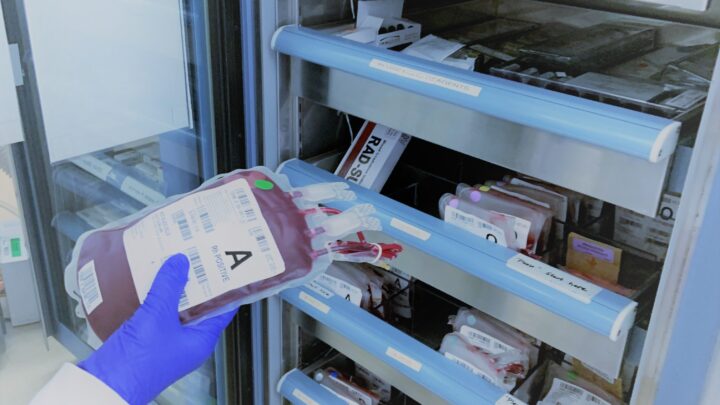There are 4 core hospital rotations structured to provide exposure to both clinical and laboratory-based Transfusion Medicine focusing on the recipient; and one core rotation with Canadian Blood Services focusing on the donor. Participating sites include McMaster University Medical Centre, Juravinski Hospital, Hamilton General Hospital, St. Joseph’s Healthcare and the Canadian Blood Services – Hamilton centre, Toronto centre, and (Head Office -Ottawa).
During the Transfusion Medicine training program, trainees work closely with hematologists, pathologists and technologists whose interests span diverse areas of Transfusion Medicine including clinical and basic research. Biostatistics and critical appraisal are emphasized through exposure to the McMaster Transfusion Research Program, based at the MUMC site (Nancy Heddle, director). Academic Half-Day sessions are organized for all TM trainees in Canada by Canadian Blood Services and are presented by teleconference once per week. They include Journal Clubs (once per month), topic teaching and case based learning. Dedicated Multidisciplinary Academic Half-Days are organized for all Residents at McMaster University to address ethical and professional issues. Quality control and quality assurance are covered in both laboratory and clinical rotations.
Program Information
MCMASTER UNIVERSITY MEDICAL CENTER rotation (2 months) covers blood bank serology, clinical management of transfusion needs for patients with haematological malignancy including allogeneic bone marrow transplantation, pediatric and neonatal transfusion medicine, prenatal testing, hemophilia care, therapeutic apheresis, HLA typing and platelet immunology testing.
JURAVINSKI HOSPITAL rotation (2 months) covers flow cytometry, stem cell processing and collection, and Transfusion Medicine needs for special patient population including haematological patients undergoing autologous bone marrow transplantation and orthopaedic surgery.
HAMILTON GENERAL HOSPITAL rotation (2 months) covers blood bank serology and special patient populations including trauma and cardiac surgery, prenatal testing.
St. JOSEPH’S HEALTHCARE rotation (2 months) covers TM serology, general hematology patients, nephrology patients, ICU patients, surgical and obstetrical patients, tissue banking.
CANADIAN BLOOD SERVICES rotation (Stonechurch Rd. Ancaster site- 2 months) covers donor issues including eligibility criteria, blood processing and delivery, lookback/traceback, TRALI investigations, autologous blood donations; donor apheresis.
CANADIAN BLOOD SERVICES rotation (Head Office Toronto – Donor Testing- 2 months) covers donor testing (Toronto) and policies, procedures and planning; unrelated bone marrow registry, Public Health interactions including Transfusion Transmitted Injuries Surveillance System (TTISS) (Ottawa- Head Office)
LONGITUDINAL ACTIVITIES (ongoing throughout training, see P.9) These activities continue throughout the training period and including didactic teaching sessions, operational and administrative meetings. These activities include: TM Trainee Presentation Rounds, Multidisciplinary Academic (MAD) Day, Transfusion Medicine “Lunch and Learn” sessions, TM University of Toronto Intercity rounds, Hematology Grand Rounds, Transfusion Medicine Operations meetings, Transfusion Committee meetings, CBS centre directors meeting, Research in progress meeting of the McMaster Transfusion Research Program, Quality Management Program—Laboratory Services (QMPLS) meetings (http://www.qmpls.org/) and Ontario Blood Advisory Committee (OBAC) (http://transfusionontario.org/en/cmdownloads/categories/guidelines/) meetings.
RESEARCH (2 months)
ELECTIVE (4 months)
Typical Rotation Schedule
YEAR 1 |
||||||
|---|---|---|---|---|---|---|
| BLOCK | 1 | 2 | 3 | 4 | 5 | 6 |
| Dates | July/ Aug | Sept/ Oct | Nov/ Dec | Jan/ Feb | Mar/ Apr | May/ Jun |
| MUMC | JH | HGH | CBS | SJH | Research | |
YEAR 2 |
||||||
|---|---|---|---|---|---|---|
| BLOCK | 7 | 8 | 9 | 10 | 11 | 12 |
| Dates | July/ Aug | Sept/ Oct | Nov/ Dec | Jan/ Feb | Mar/ Apr | May/ Jun |
| CBS (HO/DT) | Research | Elective | CBS | Elective | Research | |
MUMC = McMaster site; SJH = St Joseph’s Hamilton; JH= Henderson Hospital; HGH = Hamilton General Hospital; R = Research; E = Elective; CBS = Canadian Blood Services; HO = Head Office (Ottawa); DT-Donor Testing- Canadian Blood Services, Toronto
Academic half days are organized jointly by the Chief Resident and the CBS Trainee Coordinator, for all Transfusion Medicine Trainees in Canada. Half-days occur on a weekly schedule consist of a rotating schedule of Journal Club sessions (co-ordinated by the Program Director), Topic Teaching sessions, Case-Based Learning & Textbook Review sessions, and Scientific Sessions. All sessions are conducted via teleconference with the slide set distributed in advance and available on the TM Website. The chief resident moderates the session and one or more faculty members including a content expert are invited to attend. All of these learning activities are self-approved group learning activities (Section 1) as defined by the Maintenance of Certification program of The Royal College of Physicians and Surgeons of Canada. The current schedule for academic half-day as well as archived presentations from past academic half-days are kept on the CBS TM Website.
Journal Club sessions involve the discussion and critical appraisal of a recent journal article relevant to Transfusion Medicine. The topics for journal club presentations must be approved by the journal club coordinator in advance.
Topic Teaching sessions are a series of tutorials that provides guidance from experts on key topics in transfusion medicine – what is important? What is relevant? CBS Medical and Scientific staff will take a lead role in providing this guidance. These sessions are designed to cover specific RCPSC Subspecialty Committee Topics which are identified in the distributed pre- reading material.
Case Based Learning & Textbook Review sessions follow a 2-year rotating curriculum that covers most chapters of 3 key Transfusion Medicine textbooks- Mollison’s Blood Transfusion in Clinical Medicine; Hillyer’s Blood Banking and Transfusion Medicine; and the AABB technical manual (reference copies of these textbooks are available through the Program Director’s office) cutting edge science.
Scientific Sessions are presentations by CBS faculty.
RESEARCH
Trainees are required to complete a research project during their Transfusion Medicine training program. Projects can include quality assurance projects, systematic reviews, clinical research, or basic science projects. Trainees are encouraged to present their results at national and international meetings (e.g. Canadian Society for Transfusion Medicine, American Association of Blood Banks, American Society of Hematology, Royal College of Physicians and Surgeons of Canada). The Program Director can help trainees identify suitable faculty supervisors to suit their needs.
PREREQUISITES
Subspecialty Training Requirements In Transfusion Medicine
ELIGIBILITY REQUIREMENTS
Candidates must have Royal College Certification in Internal Medicine + Hematology, Pediatrics + Pediatric Hematology Oncology, Hematological Pathology, Anesthesiology or General Pathology.
Applications to receive funding for a transfusion medicine resident through Canadian Blood Services must be received by August 20 for a start date of July 1 of the following academic year.
The application, submitted by the university’s transfusion medicine program director, must include the following:
- the potential trainee’s CV (preferably including a statement of interest and career plans)
- copies of letters of references for the trainee received by the university program
- a letter stating that the candidate will be admitted to the university’s transfusion medicine training program.
Note: The candidate must:
- have completed medical school training in Canada
- have a license to practice medicine in the province in which the training will occur
Canadian Blood Services will allot the available funding using the following considerations:
- Evaluation of the potential trainee’s application by a medical/scientific committee whose membership includes Canadian Blood Services employees plus representation from without Canadian Blood Services; the latter will include only physicians/scientists who are not affiliated with any of the currently accredited training programs;
- Geographical distribution of funding (since funding of these positions comes from all provinces serviced by Canadian Blood Services);
- Trainee and program preferences (i.e. for situations in which a trainee applies to more than one program and/or a program submits more than one application to Canadian Blood Services).
Canadian Blood Services’ decision regarding funding will be communicated to the program directors by February 28th of the same year.
If you have any questions regarding the application process, please contact:
Thresha Bissondyal
Senior Education Program Associate
Department of Pathology & Molecular Medicine, McMaster University
pmmtm@mcmaster.ca
Program Contacts

Thresha Bissondyal
Senior Education Program Associate
Medical Biochemistry, Clinical Biochemistry, Transfusion Medicine, Medical Microbiology


